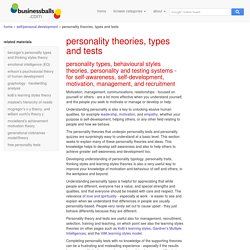

The 5 types of mentors you need in your life. iStock Here’s how to assemble your personal dream team, with tips from business expert Anthony Tjan.
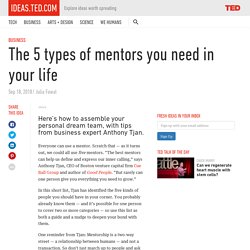
Everyone can use a mentor. Scratch that — as it turns out, we could all use five mentors. “The best mentors can help us define and express our inner calling,” says Anthony Tjan, CEO of Boston venture capital firm Cue Ball Group and author of Good People. Positive impacts of the career development industry. Reinventing Your Career in the Time of Coronavirus.
Unexpected events or shocks disrupt our habitual routines, jolt us out of our comfort zones, and lead us to ask big questions about what matters and what is worth doing.
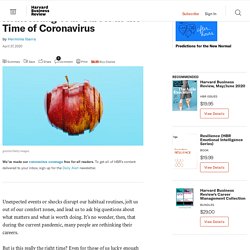
It’s no wonder, then, that during the current pandemic, many people are rethinking their careers. But is this really the right time? Even for those of us lucky enough not be sick, caring for others who are sick, or scrambling to make ends meet, the pandemic has increased uncertainty and caught us unprepared — psychologically, financially, and infrastructurally. The situation feels threatening. And, as psychologists have shown, threatening situations prompt us to behave conservatively — the opposite of what is required when we’re considering a career change. Should You Change Careers Because Of The Pandemic? The pandemic and its fallout definitely impact career planning.
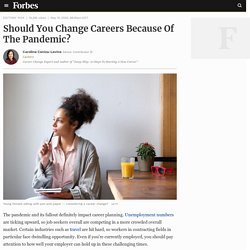
Unemployment numbers are ticking upward, so job seekers overall are competing in a more crowded overall market. Certain industries such as travel are hit hard, so workers in contracting fields in particular face dwindling opportunity. Even if you’re currently employed, you should pay attention to how well your employer can hold up in these challenging times. If you find yourself in a troubled industry, should you change careers and target other areas? Rewire Your Brain for Success by Practicing This Simple 5-Minute Habit, According to Neuroscience.
We enroll every resource at our disposal in the pursuit of success, why wouldn't we fully utilize the engine behind it all--the human brain?
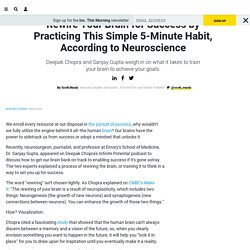
How Your Strengths Can Sometimes Become Weaknesses. Should You Always Strive to Work at the Most ‘Prestigious’ Places? Well … If you want to build a successful career, you have a dilemma on where to start.
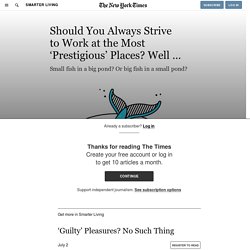
Should you pick the most prestigious organization, where you’ll be a small fish in a big pond? Or should you take the most influential position, where you’ll be a big fish in a small pond? Kat Cole has an answer, and it’s not what you’d expect. At just 32, Ms. Cole became the president of a billion-dollar brand: Cinnabon.
Although people are often drawn to the workplaces with the highest status, it’s not always best to be in the biggest pond. Being dropped to a lower division sent teams down to a smaller pond with weaker competition. The strongest opportunities for development aren’t always in the most influential place. Apprenticeships and traineeships career choices and pathways - AAPathways. Vocational & Higher Education Australian Apprenticeships or higher education, it doesn't have to be one or the other.
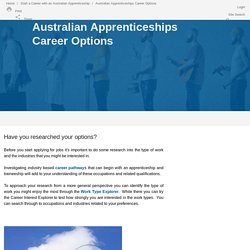
People move between these sectors, particularly those who start in the vocational sector and later in their career decide to add to their skills through a university course. Some occupations are certainly strongly related to the completion of a university course, while others are connected to vocational training. In some cases professional occupations can have a recognised vocational training entry point. Australian Apprenticeships can start a career pathway starting at an entry-level qualification and going to higher levels, such as Diplomas and Advanced Diplomas.
What to Include in a Resume Skills Section. The skills section of your resume includes your abilities that are related to the jobs you are applying for.
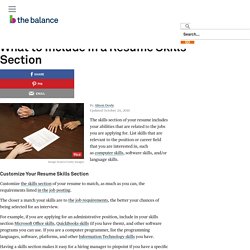
List skills that are relevant to the position or career field that you are interested in, such as computer skills, software skills, and/or language skills. Customize Your Resume Skills Section Customize the skills section of your resume to match, as much as you can, the requirements listed in the job posting. The closer a match your skills are to the job requirements, the better your chances of being selected for an interview.
How to Look Confident Even When You Are Not Infographic. We Need A Workplace Performance Focus - Now - eLearning Industry. Free articles - The Dulwich Centre. "You Can't Make Me!" - Effective Techniques for Managing Highly Resistant Clients - by Clifton Mitchell, Ph.D. This is an introductory to intermediate level course.
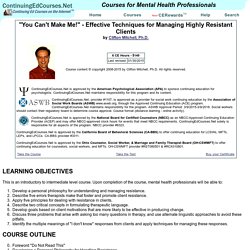
Upon completion of the course, mental health professionals will be able to: Develop a personal philosophy for understanding and managing resistance. Describe five errors therapists make that foster and promote client resistance. Apply five principles for dealing with resistance in clients. Describe two critical concepts in formulating therapeutic language. Foreword "Do Not Read This" Developing a Personal Philosophy for Handling Resistance Understanding Resistance Conventional Definitions Alternative Perspectives: The Social Interaction Theorists Resistance and Influence: Breaking the Negative Cycle Client Dynamics Often Mislabeled as Resistance The Positive Side of Resistance Common Errors Therapists Make That Create and Foster Resistance Your Client is Not Making Progress Toward What?
The course was created from, and is based on, the book, Effective Techniques for Dealing with Highly Resistant Clients. Definition of Empathy by Merriam-Webster. Personality styles, types, theories and psychometrics models, personality tests and quizzes theory. Personality models on this page The Four Temperaments/Four Humours Carl Jung's Psychological Types Myers Briggs® personality types theory (MBTI® model) Keirsey's personality types theory (Temperament Sorter model) Hans Eysenck's personality types theory Katherine Benziger's Brain Type theory William Moulton Marston's DISC personality theory (Inscape, Thomas Int., etc) Belbin Team Roles and personality types theory The 'Big Five' Factors personality model FIRO-B® Personality Assessment model The Birkman Method®
